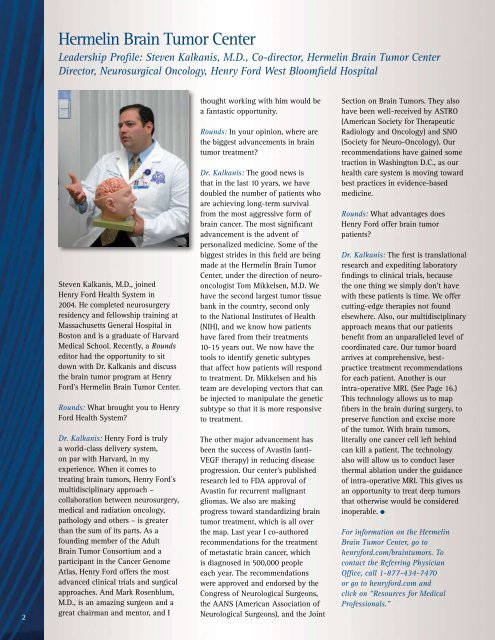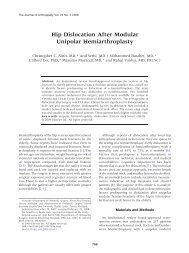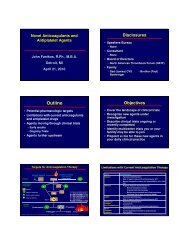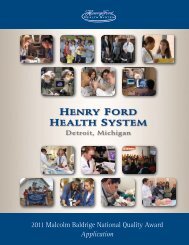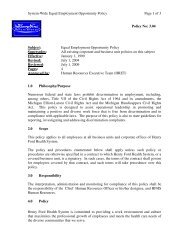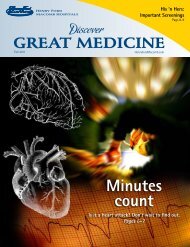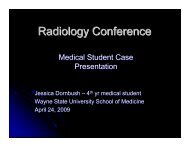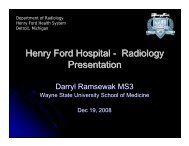Fall 2010 - Henry Ford Health System
Fall 2010 - Henry Ford Health System
Fall 2010 - Henry Ford Health System
- No tags were found...
Create successful ePaper yourself
Turn your PDF publications into a flip-book with our unique Google optimized e-Paper software.
Hermelin Brain Tumor CenterLeadership Profile: Steven Kalkanis, M.D., Co-director, Hermelin Brain Tumor CenterDirector, Neurosurgical Oncology, <strong>Henry</strong> <strong>Ford</strong> West Bloomfield Hospital2Steven Kalkanis, M.D., joined<strong>Henry</strong> <strong>Ford</strong> <strong>Health</strong> <strong>System</strong> in2004. He completed neurosurgeryresidency and fellowship training atMassachusetts General Hospital inBoston and is a graduate of HarvardMedical School. Recently, a Roundseditor had the opportunity to sitdown with Dr. Kalkanis and discussthe brain tumor program at <strong>Henry</strong><strong>Ford</strong>’s Hermelin Brain Tumor Center.Rounds: What brought you to <strong>Henry</strong><strong>Ford</strong> <strong>Health</strong> <strong>System</strong>?Dr. Kalkanis: <strong>Henry</strong> <strong>Ford</strong> is trulya world-class delivery system,on par with Harvard, in myexperience. When it comes totreating brain tumors, <strong>Henry</strong> <strong>Ford</strong>’smultidisciplinary approach –collaboration between neurosurgery,medical and radiation oncology,pathology and others – is greaterthan the sum of its parts. As afounding member of the AdultBrain Tumor Consortium and aparticipant in the Cancer GenomeAtlas, <strong>Henry</strong> <strong>Ford</strong> offers the mostadvanced clinical trials and surgicalapproaches. And Mark Rosenblum,M.D., is an amazing surgeon and agreat chairman and mentor, and Ithought working with him would bea fantastic opportunity.Rounds: In your opinion, where arethe biggest advancements in braintumor treatment?Dr. Kalkanis: The good news isthat in the last 10 years, we havedoubled the number of patients whoare achieving long-term survivalfrom the most aggressive form ofbrain cancer. The most significantadvancement is the advent ofpersonalized medicine. Some of thebiggest strides in this field are beingmade at the Hermelin Brain TumorCenter, under the direction of neurooncologistTom Mikkelsen, M.D. Wehave the second largest tumor tissuebank in the country, second onlyto the National Institutes of <strong>Health</strong>(NIH), and we know how patientshave fared from their treatments10-15 years out. We now have thetools to identify genetic subtypesthat affect how patients will respondto treatment. Dr. Mikkelsen and histeam are developing vectors that canbe injected to manipulate the geneticsubtype so that it is more responsiveto treatment.The other major advancement hasbeen the success of Avastin (anti-VEGF therapy) in reducing diseaseprogression. Our center’s publishedresearch led to FDA approval ofAvastin for recurrent malignantgliomas. We also are makingprogress toward standardizing braintumor treatment, which is all overthe map. Last year I co-authoredrecommendations for the treatmentof metastatic brain cancer, whichis diagnosed in 500,000 peopleeach year. The recommendationswere approved and endorsed by theCongress of Neurological Surgeons,the AANS (American Association ofNeurological Surgeons), and the JointSection on Brain Tumors. They alsohave been well-received by ASTRO(American Society for TherapeuticRadiology and Oncology) and SNO(Society for Neuro-Oncology). Ourrecommendations have gained sometraction in Washington D.C., as ourhealth care system is moving towardbest practices in evidence-basedmedicine.Rounds: What advantages does<strong>Henry</strong> <strong>Ford</strong> offer brain tumorpatients?Dr. Kalkanis: The first is translationalresearch and expediting laboratoryfindings to clinical trials, becausethe one thing we simply don’t havewith these patients is time. We offercutting-edge therapies not foundelsewhere. Also, our multidisciplinaryapproach means that our patientsbenefit from an unparalleled level ofcoordinated care. Our tumor boardarrives at comprehensive, bestpracticetreatment recommendationsfor each patient. Another is ourintra-operative MRI. (See Page 16.)This technology allows us to mapfibers in the brain during surgery, topreserve function and excise moreof the tumor. With brain tumors,literally one cancer cell left behindcan kill a patient. The technologyalso will allow us to conduct laserthermal ablation under the guidanceof intra-operative MRI. This gives usan opportunity to treat deep tumorsthat otherwise would be consideredinoperable. ●For information on the HermelinBrain Tumor Center, go tohenryford.com/braintumors. Tocontact the Referring PhysicianOffice, call 1-877-434-7470or go to henryford.com andclick on “Resources for MedicalProfessionals.”


